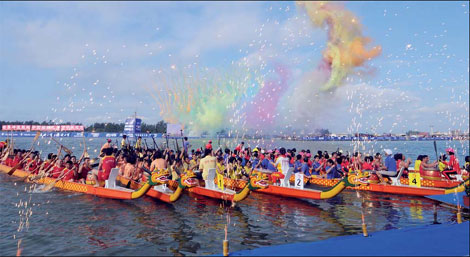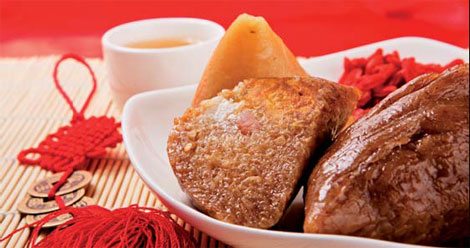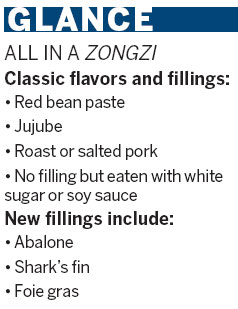
The Chinese hold dragon boat races to celebrate the traditional festival. Jiang Jurong / for China Daily

Zongzi remain the strong favorite among Dragon Boat Festival delicacies. Tian Jingli / for China Daily
Meet and eat the top contender at every dragon boat festival since ancient times
It was still weeks away from the Dragon Boat Festival on June 23, but He Ning was already stocking up on zongzi, to give to friends and relatives. After dragon boat racing, these bamboo-wrapped sticky rice dumplings are what Chinese people around the world most associate with the annual holiday.
Zongzi are to the Dragon Boat Festival what eggs are to Easter or roses to Valentine's Day.
"When I was young, we had so many rituals for the festival," says He, a Beijing mother and housewife who grew up in Jiangsu province. "We dusted our home, wore festive accessories and rowed the dragon boat. Now we eat zongzi and go on family outings instead."
With more than 2,000 years of history behind it, many of the traditions and rituals associated with the Dragon Boat Festival have fallen away in recent times. "But it remains as a time for family gathering and community fun," says Cao Baoming, deputy chairman of the China Folk Literature and Art Society, in Beijing.
Unlike easter eggs, however, eating zongzi represents an essential part of the festival's origins.
The Dragon Boat Festival, or Duanwu, commemorates the death of Qu Yuan, a Chu state official and poet who lived during the Warring States Period (475-221 BC) before the reunification of China under the Qin Dynasty (221-206 BC). He was exiled after opposing his king's decision to ally with the neighboring state of Qin, and when Chu was finally conquered by Qin, he committed suicide by drowning in a river on the fifth day of the fifth lunar month.
The Chu people, who admired Qu Yuan for his loyalty and integrity, threw rice dumplings into the river to feed the fish so they would not eat the body of their poet hero.
It is said people then started dragon boat racing to scare off the fish.
Today, along with eating zongzi, thousands of races are held around China and the world during the festival, at the weekend closest to the fifth day of the fifth month of the lunar calendar.
In ancient times, people considered this day to be the most evil and disruptive of the year, a time often marked by oppressive humid weather and storms as the seasons changed. Various physical and spiritual methods were adopted in the hope of keeping people healthy.
In southern and eastern China, they would hang wormwood leaves on their doors to ward off evil spirits. Eating eggs boiled with the leaves was also believed to help.
To keep them healthy in body and mind, children wore bracelets woven from colored threads, each representing the five elements of gold, wood, water, fire and earth. For similar effects, xionghuang jiu, rice wine mixed with a tiny bit of realgar, was a common drink during the Dragon Boat Festival. Parents would dab a little on the cheeks, noses and ears of their children.
Flower baths and massages were also popular health remedies during the festival.
Most of these traditions have disappeared, especially in the cities.
"I'd love to keep all those rituals. The problem is where can I get those materials? It's almost impossible here," He Ning says.
The sticky rice dumplings, however, remain the strong favorite among Dragon Boat Festival delicacies, as flour dumplings do during the Spring Festival for the Chinese New Year, and moon  cakes at the Mid-Autumn Festival. And like the others, zongzi is available all year round at street stalls, supermarkets and restaurants, with prices ranging from 2 yuan to as much as 30 yuan ($5, 4 euros) depending on the filling.
cakes at the Mid-Autumn Festival. And like the others, zongzi is available all year round at street stalls, supermarkets and restaurants, with prices ranging from 2 yuan to as much as 30 yuan ($5, 4 euros) depending on the filling.
The traditional rice dumpling usually has red bean paste, jujube or salted pork as the filling. Some are made without filling, leaving the sticky rice ball to be flavored with sugar or soy sauce.
New flavors have also sprung up to cater to modern, young and increasingly sophiscated palates. Rice dumplings filled with abalone, shark's fin and foie gras are now available.
Whatever they are filled with, zongzi will be snapped up by hungry dragon boat racers.
Like canoeing, dragon boat racing requires not only strength, but also skill and team spirit, and with usually 30 people needed to propel a boat, whole communities will gather to cheer on their team. All levels of races are held in villages, towns and cities during the festival.
The Dragon Boat Festival takes on different meanings and rituals when celebrated in Japan and South Korea, and it came as somewhat of a surprise to China, when South Korea successfully registered its version of the festival as an intangible cultural property with UNESCO in 2005.
However, this at least prompted China to reflect on how it had been preserving the Duanwu traditions, and in 2008 the festival was listed as a national holiday.
Naturally, the occasion is enjoyed and appreciated by all, especially the likes of He Ning's 10-year-old son, but it may also help increase awareness of the country's history and culture.
"I bought him a pair of dragon boat-theme shoes, and we're having a bonfire party with friends and family. Roast rice dumplings - I wonder what that tastes like," He Ning says.
Contact the writer at sunyuanqing@chinadaily.com.cn
